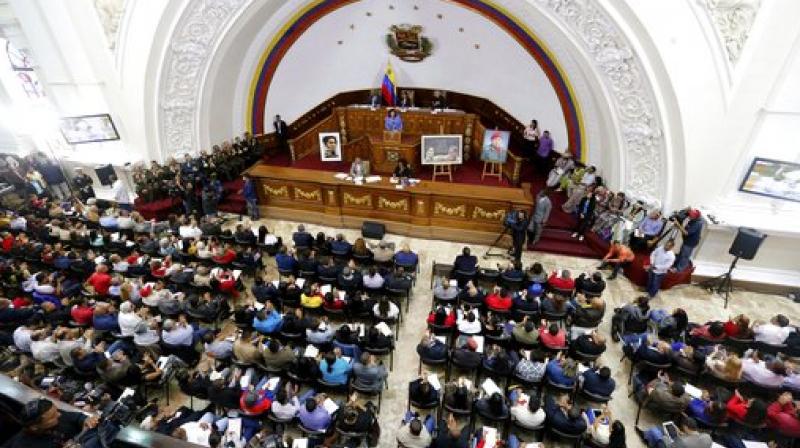Venezuela's new assembly declares itself all-powerful
The judges convicted another mayor Tuesday for failing to move against protesters during four months of political unrest.

Carascas: The new constitutional assembly assumed even more power in Venezuela by declaring itself as the superior body to all other governmental institutions, including the opposition-controlled congress.
That decree came Tuesday just hours after the assembly delegates took control of a legislative chamber and put up pictures of the late President Hugo Chavez, who installed Venezuela’s socialist system.
Delcy Rodriguez, the head of the ruling socialist party and leader of the body, said the unanimously approved decree prohibits lawmakers in congress from taking any action that would interfere with laws passed by the newly installed constitutional assembly.
“We are not threatening anyone,” said Aristobulo Isturiz, the constitutional assembly’s first vice president. “We are looking for ways to coexist.”
Leaders of congress, which previously voted not to recognize any of the new super-body’s decrees, said lawmakers would try to meet in the gold-domed legislative palace Wednesday, but there were questions whether security officers guarding the building would let them in.
The opposition to President Nicolas Maduro also faced another fight Wednesday before the government-stacked Supreme Court, which scheduled a hearing on charges against a Caracas-area opposition mayor.
The judges convicted another mayor Tuesday for failing to move against protesters during four months of political unrest.
In calling the July 30 election for the constitutional assembly, Maduro said a new constitution would help resolve the nation’s political standoff, but opposition leaders view it is a power grab and the president’s allies have said they will go after his opponents.
Before its decree declaring itself all-powerful, the assembly ousted Venezuela’s outspoken chief prosecutor, established a “truth commission” expected to target Maduro’s foes and pledged “support and solidarity” with the unpopular president.
The latest surge of protests began in early April in reaction to a quickly rescinded attempt by the government-supporting Supreme Court to strip the National Assembly of its powers. But the unrest ballooned into a widespread movement fed by anger over Venezuela’s triple-digest inflation, shortages of food and medicine, and high crime.
Opposition lawmakers said security forces led by Rodriguez broke into the congress building late Monday and seized control of an unused, ceremonial chamber almost identical to the one where lawmakers meet.
“This government invades the spaces that it is not capable of legitimately winning,” Stalin Gonzalez, an opposition lawmaker, wrote on Twitter, alluding to the opposition’s overwhelming victory in the 2015 congressional elections.
Before the assembly met Tuesday, the pro-government Supreme Court sentenced a Caracas-area mayor to 15 months in prison for not following an order to remove barricades set up during anti-government demonstrations.
Ramon Muchacho was the fourth opposition mayor ordered arrested by the high court the past two weeks. His whereabouts were not known, but he denounced the ruling on Twitter.
The constitutional assembly’s meeting Tuesday came amid mounting criticism from foreign governments that have refused to recognize the new body.
The foreign ministers of 17 Western Hemisphere nations met in Peru to discuss how to force Maduro to back down. The ministers issued a statement after the meeting condemning the body and reiterating previous calls for the parties in Venezuela to negotiate on ending the political crisis.
Meanwhile, leaders from the Bolivarian Alliance, a leftist coalition of 11 Latin American nations, met in Caracas and declared the creation of the constitutional assembly a “sovereign act” aimed at helping Venezuela overcome its difficulties.
“We reiterate the call for a constructive and respectful dialogue,” the alliance said in a statement read after the meeting.
Since the disputed election, security forces have stepped up their presence. A UN human rights commissioner report issued Tuesday warned of “widespread and systematic use” of excessive force, arbitrary detention and other rights violations against demonstrators.
Only a few dozen demonstrators heeded the opposition’s call to set up traffic-snarling roadblocks in Caracas on Tuesday to show opposition to the new assembly, underlining the fear and resignation among that has weakened turnout for street protests that once drew hundreds of thousands.
At least 124 people have been killed and hundreds injured or detained during the protests.

